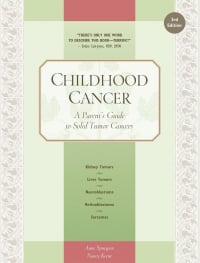Childhood Cancer
Signs and symptoms
Recurrence can happen at any time during treatment or after therapy is completed. Occasionally the child has no symptoms, but an MRI scan shows the cancer has returned. More frequently, however, signs and symptoms appear that include some or all of the indicators that were present at diagnosis:
• Discomfort
• A lump or mass
• Shortness of breath
• Pain
• Loss of appetite
• Fatigue
• Enlarged abdomen
• Dizziness
• Headaches
• Limping
Remember that many of these symptoms are also seen with normal childhood illnesses. However, persistent loss of appetite, fatigue, or unusual symptoms require a call to your oncologist.
Zack (age 6) was in remission after 13 rounds of chemo for stage IV neuroblastoma. He had scans every 3 months and everything was looking good. Nine months later, Zack started to complain that his hair hurt. “Hair pain” seemed weird to me, so we went to the doctor. Blood test results came back abnormal, and the worry intensified. We admitted Zack to the hospital feeling fine, with the exception of his sore hair! The doctor ordered a bunch of tests and scans which came back fine, but when the bone marrow aspiration was done, the news was not good. His cancer had come back.
In some cases, parents have no warning. After they bring their child in for a routine examination, they receive a totally unexpected telephone call from the doctor with the news.
I am a long-term survivor (30 years old), who first was diagnosed with cancer at age 8 and subsequently relapsed three times, at ages 13, 15, and 16. The first relapse was by far the worst to deal with emotionally. I had been off treatment with good counts for 2 years. My mother and I didn’t even wait for the test results; we went out to lunch and went shopping. Later that day, I called the clinic, and my doctor told me she needed to talk to my mother. I heard my mother say, “No, no, oh no,” and she started to cry. I just stood there feeling numb, knowing the news was bad. The cancer had returned. We held each other and cried.
The site of recurrence depends on the type of solid tumor. The disease can recur in the area of the original tumor, or it may develop elsewhere.
Jody was complaining about pain and a feeling of pressure in his leg bones. I kept bringing him back to the oncologist, saying that something was wrong, that he was in great pain, but the doctor kept insisting that it was just growing pains. He didn’t even examine his legs for a month. When he did, he could feel parts of the bone radiating heat. The bone scan showed the cancer in the exact spots that Jody had pointed out.
Table of Contents
All Guides- Introduction
- 1. Diagnosis
- 2. Bone Sarcomas
- 3. Liver Cancers
- 4. Neuroblastoma
- 5. Retinoblastoma
- 6. Soft Tissue Sarcomas
- 7. Kidney Tumors
- 8. Telling Your Child and Others
- 9. Choosing a Treatment
- 10. Coping with Procedures
- 11. Forming a Partnership with the Medical Team
- 12. Hospitalization
- 13. Venous Catheters
- 14. Surgery
- 15. Chemotherapy
- 16. Common Side Effects of Treatment
- 17. Radiation Therapy
- 18. Stem Cell Transplantation
- 19. Siblings
- 20. Family and Friends
- 21. Communication and Behavior
- 22. School
- 23. Sources of Support
- 24. Nutrition
- 25. Medical and Financial Record-keeping
- 26. End of Treatment and Beyond
- 27. Recurrence
- 28. Death and Bereavement
- Appendix A. Blood Tests and What They Mean
- Appendix B. Resource Organizations
- Appendix C. Books, Websites, and Support Groups

